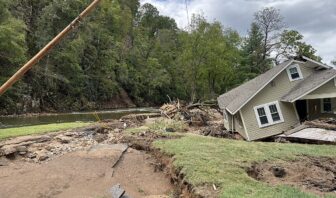For Immediate Release
Friday, May 30, 2014
Contact:
Mike Tidwell, 240-460-5838, mtidwell@chesapeakeclimate.org
Kelly Trout, 240-396-2022, kelly@chesapeakeclimate.org
Cove Point Opponents Call on O’Malley to Act After PSC Fails to Require Safety Study for Gas Export Proposal
Commission confirms plant would cause net economic harm, requiring Dominion to pay $48 million in compensation for economic and climate pollution impacts
Groups denounce decision to grant conditional permit, especially given lack of federal or state human risk assessment
BALTIMORE — Maryland opponents of the controversial proposed Cove Point liquefied natural gas export proposal announced Friday that they would appeal to Governor Martin O’Malley and the Department of Natural Resources to conduct a human safety study in response to the Maryland Public Service Commission’s ruling to grant a conditional permit for the project. In its permit ruling, the PSC openly acknowledges that the gas liquefaction plant would be a net economic negative for the state and requires Dominion to pay $48 million for expected economic and environmental harm. Yet, the PSC failed to require a basic study of human safety risks for the thousands of people living in close vicinity.
The PSC confirmed that the “LNG facility will not provide net economic benefit to Maryland citizens” (p. 4) and acknowledged numerous risks to consumers and to the quality of life of residents living near the facility in southern Calvert County. In particular, the PSC is requiring the applicant — Virginia-based Dominion Resources — to pay $400,000 annually over 20 years to the Maryland Energy Assistance Program to partially compensate for impacts to low-income ratepayers. To “mitigate” the project’s harm to the climate, the commission is mandating that Dominion pay a total of $40 million over five years to the state’s Strategic Energy Investment Fund to be used for the development of renewable and clean energy resources in Maryland.
Opponents say these conditions are insufficient and they were especially disappointed that the PSC did not require an independent “Quantitative Risk Assessment” as a basic condition of the permit granted Friday. To date, neither federal nor state regulators have agreed to conduct a basic assessment showing the actual, measurable risk this plant could bring to nearby residents in the form of explosions and fire. In 2006, the Maryland Department of Natural Resources did conduct such a study for previous LNG import installations at Cove Point, and that study showed that 360 homes within a 4,265-foot “consequence zone” could already be affected by a catastrophic accident.
Calvert residents and their allies have simply asked that a similar assessment be done for Dominion’s current proposal, which would dramatically increase potential hazards by adding a large-scale gas liquefaction train utilizing highly explosive liquefied propane gas and requiring new stores of volatile chemicals. The PSC today failed to mandate such a study, even though the LNG export facility would be the first ever located within close proximity to so many homes.
The PSC’s permit ruling only pertains to 130-megawatt gas-fired power plant that Dominion needs to build as part of the liquefaction facility. The PSC explicitly conditioned its permit upon the Federal Energy Regulatory Commission’s final decision, meaning Dominion cannot start construction now.
Mike Tidwell, director of the Chesapeake Climate Action Network, said:
“Today the PSC expressed concern for the safety of people living closest to the proposed plant, but failed to actually protect these people. Bottom line: this export facility should not be built. The PSC confirmed it’s a harm to consumers and the environment. We now look to Governor O’Malley as the final back stop to bring a basic safety assessment to light. While the final decision here is a federal one, we’re convinced that a basic, quantitative risk study of major explosion or other safety threats will influence any final federal permitting of this plant. The threat to Marylanders’ lives and livelihoods is simply too great to have our elected leaders simply stand on the sidelines.”
Josh Tulkin, director of the Sierra Club, Maryland Chapter, said:
“While we understand the constraints of their jurisdiction, we’re are very disappointed in the PSC decision. We appreciate the PSC highlighting the need for Dominion to improve their safety considerations, and for the contribution to low-income ratepayers. But these will be little consolation to the communities impacted by the health and environmental damage expected from this project.”
###




